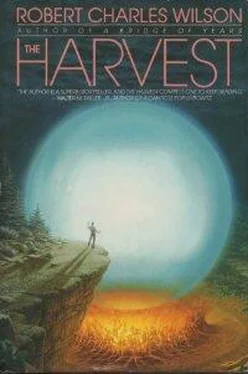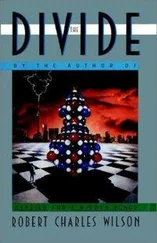“Mm? Well, he isn’t anymore.”
They looked at each other.
Kindle said, “What do you really expect to accomplish here tonight? One in ten thousand—so we get maybe five people if everybody who ought to show up really does. Maybe six or seven if the notice got as far as Coos Bay or Pistol River. A pitiful handful, in other words. So what’s the point?”
“The point,” Matt said, “is that I mean to save Buchanan.”
Kindle winced and shifted in his chair. “The world’s been hijacked, Matthew. The whole fuckin’ world. In the face of that, how do you propose to save one piddling little town?”
“I don’t know,” Matt said. “But I mean to do it.”
* * *
Kindle’s estimate had been pessimistic, but not by much. At fifteen minutes after the hour, eight people had shown up—six from Buchanan, two from outlying farms.
One in ten thousand? Was that really possible?
Matt supposed it might be. He was reminded that one in ten thousand was roughly the number of ALS cases in the general population—what people commonly called Lou Gehrig’s Disease. He had heard of two such cases in all of Morgan County, which included Buchanan and three smaller towns.
If the numbers were correct, this turnout was a testimony to the effort Matt had expended, placing ads in the Observer, posting leaflets, even cadging a few minutes on the local radio news. The radio session had been especially difficult, since no one seemed to know a polite word to differentiate the humans in the audience from the recently immortal. “Shoot, Dr. Wheeler, we’re all human,” the station manager had insisted. Well, perhaps. Anyway, no one had made much mention of Contact even in the local news;
it was still too novel, too profound in its implications—or maybe they understood it collectively: ESP, as Kindle had said.
The radio news department settled on what Matt considered a cumbersome circumlocution: “Those unconvinced by the experience so many of us shared on the last Friday in August are invited to a meeting to be held in Room 106 at Buchanan Regional Hospital, the evening of September the 28th. For details, contact Dr. Matthew Wheeler,” and his home and office phone numbers, followed by six seconds of dead air and a weather report.
He was grateful for the announcement, but the experience seemed to foreshadow a whole world of negotiations and misunderstandings—precisely what he hoped to anticipate and even forestall.
For the sake of Buchanan. For the sake, he supposed, of himself and Tom Kindle and these eight doubtful-looking souls waiting for him to speak.
* * *
He cleared his throat and introduced himself. He felt more than a little misplaced up here. He had attended how many meetings in his life—how many graduation exercises, board meetings, staff briefings? Too many. He had never liked any of them. Meetings, in Mart’s opinion, were an excuse to drink coffee, accumulate career karma, and avoid the threat of real work. But here he was. He had even wheeled in the big silver coffee urn from the cafeteria, from which Tom Kindle was tapping a cup. Kindle glanced at him with an air of patient amusement—tilt on, Don Quixote.
He thanked everyone for coming.
“We’re here to talk about the future,” he said. “I think we share some common interests, and I think we’re facing some common problems. Maybe if we get together now we can do something about that. But since there’s not many of us present, maybe we should begin with introductions. Let’s start with the front row. Thank you.”
Matt jotted each name in his notebook as it was spoken:
Miriam Flett. Front row left. In her mid-sixties, Matt guessed, not infirm, but thin as a straw. She wore a silver stickpin in the shape of a cross, and she announced her name as if she expected an argument. She sat down immediately and without comment and folded her arms.
Bob Ganish. Two seats away from Miriam. A salesman, he said, at Highway Five Ford. A round man of middle age dressed as if he had just left a golf game. Were people still golfing, Matt wondered, or was it just that nobody cared anymore if you walked around in polyester slacks and a scuffed pair of putting shoes? “I agree we have a lot of problems, Dr. Wheeler, but I don’t know what we can do about it. But it’s nice to know there are people left who still think the old way.” Ganish sat down.
“I’m Beth Porter and this is Joey Commoner.” No need to jot these names. Beth had dressed up tonight—wore a long-sleeved shirt to cover her tattoo. But Joey, who had also been Mart’s patient more than once in the last fifteen years—who had been buying antibiotics on Mart’s prescription since Beth dragged him into the office—sat with a grim expression, arms clasped together over a black T-shirt, sullen.
Clockwise from Beth and Joey: Chuck Makepeace, a sitting member of the City Council. That might be useful, Matt thought. Mid-thirties, three-piece suit, receding hairline, natty little wire-rimmed glasses. “If we do this again, Dr. Wheeler, we should elect a chairman and follow some rules of order—but maybe I’m getting ahead of myself.”
“Excellent suggestion,” Matt said. “But let’s get to know each other first.”
Tim Belanger, about Joey’s age; blond, puppyish and eager to cooperate. “I work at City Hall, too. I’m a records clerk for Water and Power. Or I used to be. Hardly anybody shows up at the office anymore.”
Abigail Cushman, who had driven in from her husband’s farm out in Surrey Heights, “an hour in that old truck, but Buddy said take it. He doesn’t give a damn, pardon me, what I do anymore.” She wore a discount-house dress and sweater and thick glasses with masculine rims taped at one joint. Matt guessed she might be fifty years old, maybe older. “Buddy’s looking after the kids. Our grandchildren, actually. Our daughter and son-in-law died last year, so we took the two boys. They’re at home. They didn’t want to come. I’m the only one who… I mean, they’re not…” The words ran out. She paused and blinked at the room as if she’d forgotten what she was doing here. Bob Ganish coughed into his hand. “Anyway,” she said. “Call me Abby.” Abby sat down.
Paul Jacopetti, big, barrel-chested, sunburned, sixty-five, retired manager of a tool-and-die company in Corvallis, owned a hobby farm out along the Lake Roads. “Not sure if there’s any point in being here,” he said. “We can talk all we want, but it looks to me like the horse left the barn some time ago.”
Tom Kindle introduced himself from his wheelchair, then turned to face the podium. “Mr. Jacopetti’s got a point, Matthew. It’s nice we’re all here and everything, but what’s the purpose? Therapy or strategy?”
“Strategy,” Matt said. “Though a little therapy might be welcome.” There were a few nervous smiles. He turned a page in his notebook. “The big problem ahead, it seems to me, is that you can’t run a national economy when nobody’s going to work. Everything seems all right so far. The grocery stores are open, the trucks are bringing in food, the water runs, and the lights are on. Good. But you’ve all noticed the changes. Mr. Belanger mentioned that people aren’t showing up for work at City Hall. I guess nobody minds if the tax bills don’t get out.” Smiles—but only a few. Some of these people, like Mrs. Cushman, obviously hadn’t thought this far ahead.
“But there are such things as essential services, and if those people stop working we could be in trouble. The hospital, for instance. There hasn’t been much call for our work, admittedly, but even so, I can’t maintain a twenty-four-hour emergency room all by myself. I’m not the only physician on call, but there are fewer every day. The administration tells me the hospital won’t close entirely… at least not yet. It’s the ‘not yet’ that worries me. I hear it a lot. People are vague about the future—maybe you’ve noticed. I don’t think they know what’s going to happen much better than we do. But they seem to expect something. Some kind of massive, sweeping change.”
Читать дальше












